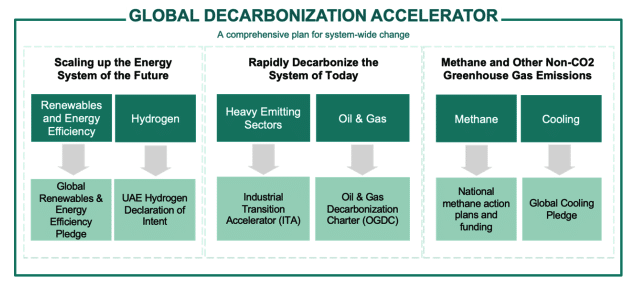Fifty Companies Sign Oil and Gas Decarbonization Charter Unveiled at UN Climate Summit

Fifty companies, representing over 40 percent of global oil production have committed to near-zero methane emissions and end routine flaring by 2030 under the Oil and Gas Decarbonization Charter (OGDC) launched at the 28th Conference of the Parties to the U.N. Framework Convention on Climate Change. The charter is part of series of initiatives launched under the Global Decarbonization Accelerator to further the energy transition and drastically cut global emissions.
The OGDC signatories, which include more than 29 National Oil Companies, agreed on a number of actions. Among the key actions, the signatories committed to better align with broader industry best practices to speed up decarbonization, striving to implement current best practices by 2030. The companies also committed to reducing energy poverty and ensuring secure and affordable energy to aid in the development of all economies. Other actions include investing in renewables, low-carbon fuels and negative emissions technologies, improving transparency and reporting of emissions and their performance and progress in reducing emissions.
The GDA outlines strategies for system-wide change, concurrently addressing both energy demand supply. The three pillars of the initiative are “scaling the energy system of tomorrow, decarbonizing today’s energy system, and targeting methane and other non-CO2 greenhouse gases.”
The first pillar includes the Global Renewables and Energy Efficiency Pledge under which 116 countries have agreed to triple installed renewable generation capacity to at least 11,000 gigawatts and double the global average annual rate of energy efficiency improvements from around two percent to over four percent until 2030. Further, 27 countries have signed in to the UAE Hydrogen Declaration of Intent aims to bolster global trade in low-carbon hydrogen. In addition to the OGDC, the second pillar, which targets energy system decarbonization, initiates the Industrial Transition Accelerator aimed to support decarbonization of key heavy-emitting sectors. Finally, the third pillar calls for economy-wide methane-emission reduction, with more than $1 billion to be mobilized for methane abatement initiatives.
Further, 52 nations have signed the Global Cooling Pledge, also a part of the GDA, to substantially lower global cooling emissions by 68 percent by 2050. These emissions currently represent about seven percent of global emissions are likely to triple as more nations adopt air-conditioning.
Signatories to the OGDA are listed below:
NOCs: ADNOC, Bapco Energies, Ecopetrol, EGAS, Equinor, GOGC, INPEX Corporation, KazMunaiGas, Mari Petroleum, Namcor, National Oil Company of Libya, Nilepet, NNPC, OGDC, ONGC, Pakistan Petroleum Limited (PPL), Pertamina, Petoro, Petrobras, Petroleum Development Oman, Petronas, PTTEP, Saudi Aramco, SNOC, SOCAR, Sonangol, Uzbekneftegaz, ZhenHua Oil, YPF.
IOCs: Azule Energy, BP, Cepsa, COSMO Energy, Crescent Petroleum, Dolphin Energy Limited, Energean Oil & Gas, Eni, EQT Corporation, Exxonmobil, ITOCHU, LUKOIL, Mitsui & Co, Oando plc, Occidental Petroleum, OMV, Puma Energy (Trafigura), Repsol, Shell, TotalEnergies, Woodside Energy Group.
UN Secretary-General António Guterres expressed disappointment that the pledges fall well short of what is required to meaningfully tackle the climate crisis, saying that “the fossil fuel industry is finally starting to wake up, but the promises made clearly fall short of what is required.”
More than 320 civil society organizations wrote to the COP28 Presidency emphasizing the need for a “transformational outcome” rather than voluntary pledges. The organizations criticized the move for “encouraging fossil fuel companies to make yet another set of hollow voluntary pledges, with no accountability mechanism or guarantee the companies will follow through.”
The Paris Agreement, signed in December 2015 by nearly every country in the world, commits the world leaders to keep the average global temperature below 2 degree Celsius above pre-industrial levels and try to limit that increase to 1.5 degrees Celsius.
EnerKnol Pulses like this one are powered by the EnerKnol Platform—the first comprehensive database for real-time energy policy tracking. Sign up for a free trial below for access to key regulatory data and deep industry insights across the energy spectrum.
ACCESS FREE TRIAL